INFANT PROGRAM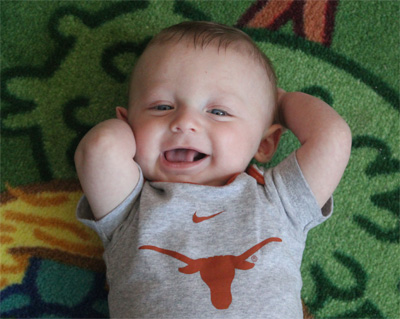
Growing Tree Childcare and Preschool has infant programs for children who are six weeks old to 1 year. Each infant is born curious and motivated to learn. All children come into the world temperamentally different from each other, thus, they need to be treated differently. The infant is dependent on close, caring, ongoing relationships as the source of developmental growth.
An infant learns most of how he or she thinks and feels by imitating behaviors around him.
Young infants are babies who are not yet mobile and range in age from newborn to somewhere between 5 and 11 months. Infants this age are dependent on others to fulfill their needs. Typically their development is rapid, as they go from barely being able to lift their heads to eventually rolling over and getting up on their knees to crawl around. Interaction and communication is critical for their development. Infants show signs of attachment to a primary caregiver and using that person for a secure base from which to explore. 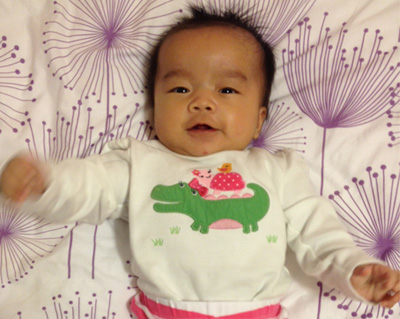
Our center must provide infants with an auditory environment that is enjoyable and relaxing, not over stimulating or distracting.
Space is arranged so children can enjoy moments of quiet play by themselves, have ample space to roll over and move freely, and can crawl toward interesting objects. Areas for younger infants are separated from those for crawlers to promote safe interactions.
Toys provided are responsive to the child's actions which include grasping toys requiring different types of manipulation; skill development boxes, containers, and stacking materials; and a variety of balls, bells, and rattles. Open shelves within infants' reach contain toys of similar type, spaced so that infants can make choices.
Mobile infants are children on the move – crawling, walking, talking and beginning to be able to explore the world around them. Our program provides an environment where children can thrive on new experiences and build on previous knowledge to improve coordination, increase communication skills and further develop thinking and reasoning. Our teachers provide plenty of opportunity for exploration and play in a safe, secure and stimulating atmosphere. 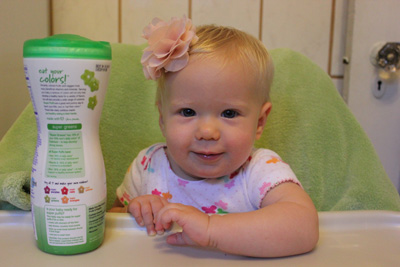 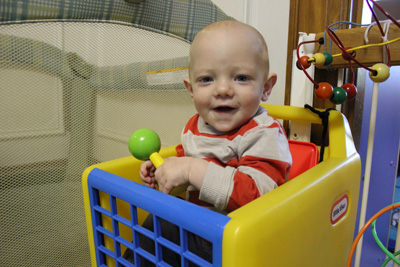
TODDLER PROGRAM
Growing Tree Childcare and Preschool has a young toddler program for children who are 1 to 2 years and a toddler program for children who are 2 to 3 years. Infants become toddlers once they start walking. They may start as early as 9 months or as late as 17 months. A toddler also learns most of how he or she thinks and feels by imitating behaviors around him. Toddlers need to move, need plenty of exercise, and should not be restricted in their gross-motor activities. Therefore, the environment they explore should be set up to encourage fine-motor development.
Our environment and schedule will allow toddlers to form expectations, to practice emerging skills, and to feel secure.
Toddlers experience a wide range of materials and processes as they explore their interests, fascinations, and natural inclinations for development. Examples are experiences with textures, sounds, colors, shapes, patterns, rhythms, paints, clay, water, light and shadow, drawing, body movement, gestures and sign language, music, photography, hearing stories, reading with teachers, assembling and disassembling, discovering hidden things, and working with multiple media and processes.
Much of the first two years of life are spent in the creation of a child's "sense of self" or the building of a first identity.
PRESCHOOL PROGRAM
Growing Tree Childcare and Preschool offers a program for children who are 3 to 5 years. Our school is dedicated to exceptionally skillful and professional care, nurturing, and optimal development of young children. Teachers work with small groups of children, and each child has a primary teacher. The curriculum is designed for children and families who want to be Chinese bilingual.
Our emergent curriculum is based on primarily children's interests and fascinations, with influences from their home cultures and occasional special offerings from the community.
Children will experience Chinese language and culture through many activities including:
- Indoor Discovery Play Zone
- Science Discovery
- Circle Time
- Math
- Reading Time
- Performing Arts
- Creative Play
- Outdoor Play
- Dramatic / Imaginary Play
- Interaction With Others
- Arts & Crafts
- Independence
- Music / Instruments
The primary emphasis is on health, safety, building effective relationships and social experiences, and supporting and facilitating optimal development of each child without getting in their way or pushing them into areas of their readiness or falling behind them in our assessments or interactions with each child.
In all aspects of the Preschool Program operations, we maintain the characteristics of continuously learning and improving; and, where the atmosphere is joyful, exciting, caring, aesthetic, compelling, and rich with creativity surprises, and the promise of great potential.
Preschool students experience a wide range of materials and processes as they explore their interests, fascinations, and natural inclinations for development. Examples are experiences with textures; sounds; colors; shapes; patterns; rhythms; paints; clay; water; light and shadow; drawing; body movement; gestures and sign language; music; photography; hearing stories; reading with teachers; assembling and disassembling; sculpturing; discovering hidden things; introduction to literacy, math, and science; and working with multiple media and processes.
Why an Indoor Discovery Play Zone?
The role of play is essential in children's learning and development. Play is how children learn to socialize, to think, to solve problems, to mature, and more importantly, to have fun. Play connects children with their imagination, their environment, their parents and family and the world. As a result, Growing Tree Childcare and Preschool has embodied an Indoor Discovery Play Zone. We created this indoor play area as we understand and recognize play is an essential element of children's development and it has an overwhelming number of benefits.
Children gain knowledge through their play. They learn to think, remember, and solve problems. Children increase their problem solving abilities through games and puzzles. Children involved in imaginary / dramatic play can strengthen their language skills by modeling other children and adults. Play with other children helps a child to learn the skills of negotiation, problem-solving, sharing, and working within groups. Children practice decision making skills, move at their own pace, and discover their own interests during play. Our Indoor Discovery Play Zone will guide children in the right direction.
However, although play is important, our program focuses on the child development as a whole. In order to maintain balance, we encourage and incorporate academics. This would be the other half of our spacious environment. Our program focuses on the following, various forms of academics, all with an emphasis in bilingual (English and Chinese) teaching. 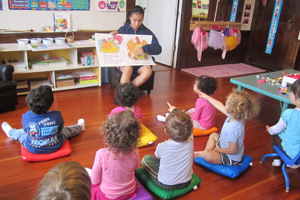
During Circle Time, children engage in storytelling and learning ABC's, numbers, colors, shapes, body parts, days of the week, months, and seasons through singing. Singing will be accompanied by the program director playing the piano while simultaneously converting the words into familiar songs. Children will bring home songs learned during the month to sing for your listening pleasure. In addition, our program will use flash cards for building and expanding their language.
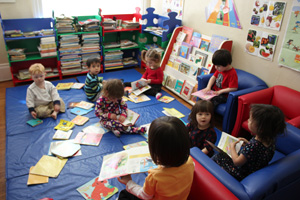
Our reading time program establishes the foundation for your children's future. This program contains an on-site children's library that includes over 1,000 educational and learning books. Teacher reads in small groups; practices concentration by silent reading; asks questions to become interested in books. We have a comfortable reading area where the provider and children can sit next to one another. We read the book first to become familiar with the story. We point out the title, author, front and back covers and where we begin reading. Our fingers are used to track words while your child gets used to left to right progression. We show the return sweep, which is when you bring your finger to the next line after the end of the previous one. We make the story as interesting as possible by using different voices for the characters and moods in the story. As children progress, the interaction increases. 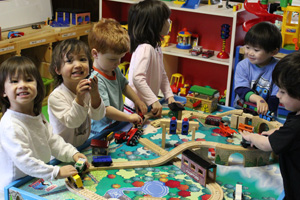
Creative Play will be experienced by assembling Thomas the Train sets, building blocks, connecting lego designs, putting together puzzles, dressing mannequins and dolls, and making clay figures. Children devise their own creations based on their imagination. In addition, they will use manipulatives by putting things and objects together.
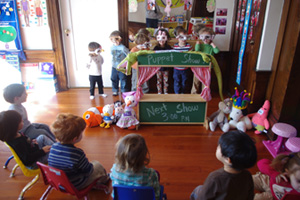
Dramatic Play through creativity will be experienced through acting out community helpers and through show and tell. In Acting, children will gain an understanding of the business sector, specifically, the restaurant business. They will be selling, dining, and eating food in a restaurant setting learning about multicultural food, healthy versus junk food, and money as it relates to math and numbers. Children will wear community helper uniforms in acting out service workers, professionals, and entrepreneurs. These include, but are not limited to, police officer, firefighter, teacher, doctor, mailman, business person, and chef.
In Show and Tell, children could bring anything from home to share (show) with other children and give details (tell) what they like most about it. We will be teaching sequence, or telling story in order. This will allow children to share their interests with others.
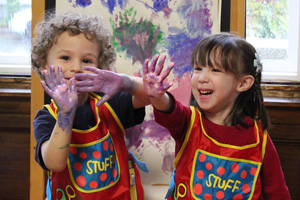
Arts & Crafts will include a wide variety of activities involving making things with one's own hands with monthly thematic plans to ignite creativity. Painting, cutting, and clay making are some examples falling under this category. Children will utilize fine motor coordination and will use manipulative items for practicing finger muscle development.
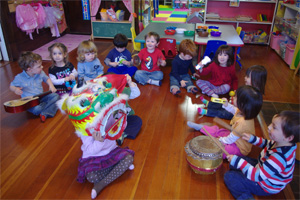
Children are exposed to music and instruments in many variations. Our approach is through the introduction of the piano keyboard. Explaining the layout and how it relates to the musical alphabet, particularly learning notes, and reading music will be taught to the children. They will understand the concept of piano while building musical interest (which they could use for any instrument they play). As you are aware, the finger muscle development for most children in this age group is not strong enough to touch down on the piano keys but they recognize the locations of "Middle C" and ultimately understand the application of the tones from low to high as in "do-re-mi-fa-so-la-ti-do."
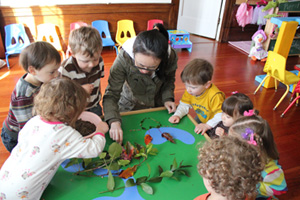
An introduction to science discovery assists children with understanding science in a fun way. Our experiments help children develop basic science skills like observing what is happening, using works to describe what is happening, using words to describe what they notice, and repeating the action to compare results. Questioning and posing answers are skills used every day in the classroom. Also, they will learn the process of growing plants. Specifically, children will understand the life cycle of plants from planting the seeds to the blooming of flowers. As far as the science curriculum at Growing Tree Childcare and Preschool, the role of materials, the use of time and space, the key role of discussion and representation, and the teacher's role are critical in the success of our program.

Children learn important math skills through their play and routines, and need to experience a lot of doing and saying, using concrete materials that they can manipulate, not through rote or memorization. Sorting, counting, letting the child combine the assignment of each number word with the physical act of either moving, touching with a finger, or at least pointing at the object it represents, using comparison words, and using words that indicate order (first, second, third) are great ways to develop logic and learn basic math skills. Through play with blocks, play dough, colors, signs and shapes, children begin to learn concepts such as classification, ordering, direction and movement, grouping, measuring, and sequencing. The bottom line is young children develop early math skills in a variety of areas, including problem solving and reasoning, number concepts, geometry and spatial sense, measurement, and patterns and relationships.
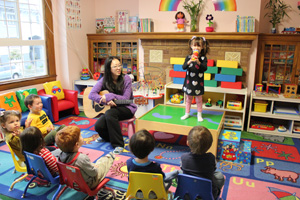
Another one of our favorite activities is incorporated into our performing arts program.
In ballet, children will learn the positions of the arms, feet, head, and body including the basic techniques of ballet. Children will learn definitions of ballet terminology, movements and steps for a beginning student plus barre work, center work, and stretching.
In singing, children will practice singing on a created stage in front of an audience comprised of children and teaching staff. By performing in front of spectators or of a group, children will become comfortable, gain confidence, and develop self-esteem in public settings.
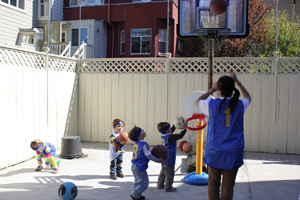
Children will be exposed to a spacious outdoor play area. There are tricycles, rubber balls, climbing structures, mini-basketball hoop, crawl tubes, slides, sand and water toys, playhouse, swings, and "monkey" bars. Our 5000 square foot outdoor space will allow children to move freely throughout while being adequately supervised.
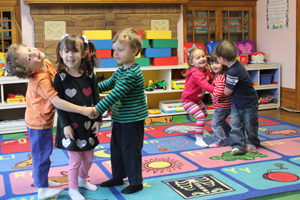
Interaction with others is important for the development of children and allows them to learn appropriate social behaviors as well as to develop higher self-esteem. Specifically, children will learn proper manners, participate in small and large group settings, ask questions to extend understanding, use language to problem solve, interact with peers and teachers, have ability to share and work cooperatively with friends and younger siblings, listen and follow directions, and children will learn the basic parts of the body (head, eyes, ears, nose, and mouth; arm, elbow, wrist, hand, and fingers; leg, knee, ankle, foot, and toes) in English and Chinese through singing.

Children will experience personal hygiene and daily necessities in becoming independent and confident. This will include, potty training, brushing teeth, making bed and folding blanket, putting on shoes, washing hands before meals and after going bathroom, and dressing themselves. |